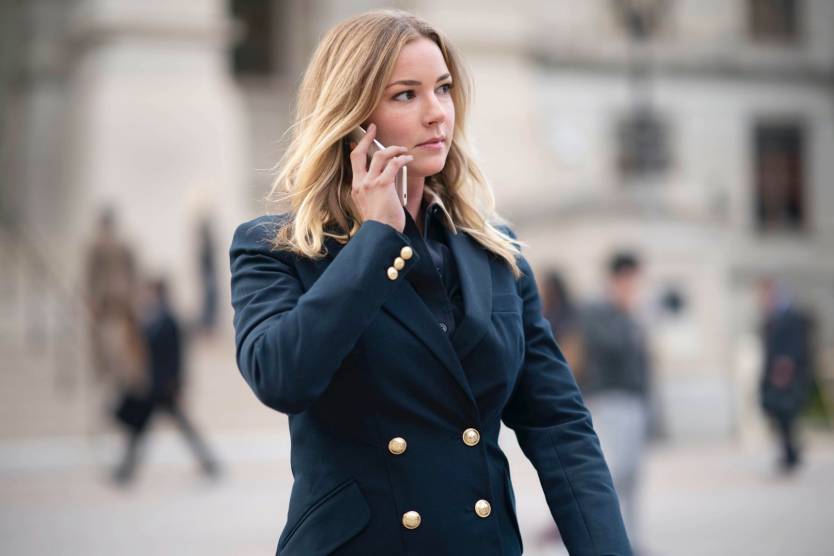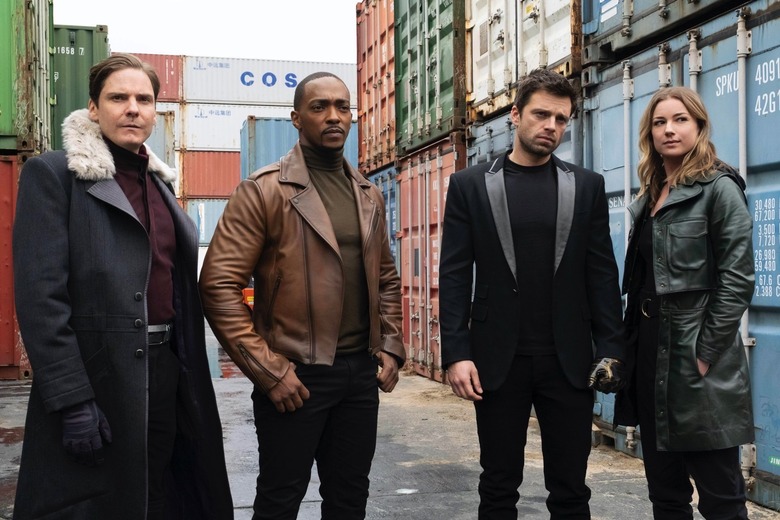Marvel Just Explained The Biggest Controversy From 'Falcon And The Winter Soldier'
Marvel's second Disney+ series concluded last Friday, and things unfolded just as we expected. The Falcon and the Winter Soldier delivered the new Captain America, with the finale dedicated to Sam Wilson's (Anthony Mackie) transformation. The show should mandatory viewing for Marvel fans, as it perfectly captures Sam's struggles with accepting this iconic position.
What's great about the TV show is that it also advances the character arcs of plenty of other Marvel heroes and anti-heroes/villains, exploring nuances that aren't necessarily possible in a bigger crossover movie where screen time is limited. However, there's a character choice that's so puzzling for fans that Marvel felt the need to explain its decisions in an article following the finale. Mind you, several spoilers follow below if you haven't yet finished all six episodes of The Falcon and the Winter Soldier.
In addition to Sam's arc, the TV show offers us Bucky's (Sebastian Stan) evolution into a true Avenger. That's something we weren't really privy to before now. Bucky was on the run after Civil War, and while he came to help the Avengers save the day in Infinity War, he was blipped away for five years. He played his part in that final battle against Thanos in Endgame, but the audience only witnessed his fighting skills in the film.
Similarly, the show allowed us to explore a few "villains," including Baron Zemo (Daniel Brühl), US Agent (Wyatt Russell), Karli Morgenthau (Erin Kellyman), and the Power Broker (Emily VanCamp). They're not true villains, but anti-heroes, and Falcon makes us want to see more of them going forward. Zemo and US Agent already seem like significant additions to the MCU. Morgenthau might be dead or severely injured, so we're not sure what might happen with her.
As for the Power Broker, well, this is the controversial choice that some MCU fans can't quite grasp. We suspected from the moment Sharon Carter first appeared in the series that she might be the mysterious Power Broker, and Marvel kept the reveal for the finale. This means we were not offered all the clues during the show that might have explained her transformation into a villain of sorts.

Sharon Carter/Agent 13 (Emily VanCamp) in Marvel Studios' The Falcon and the Winter Soldier.
Marvel published an extensive interview with Falcon and the Winter Soldier cast and crew to explain the Power Broker. It's an interview that fans have to read to understand Marvel's thinking. It also shows that the Carter twist is a problem of Marvel's own doing.
Sharon Carter helped the Captain America faction in Civil War, so she was forced to go on the run. But we never learned what happened to her after that. Marvel ignored that Steve-Sharon love story in Infinity War. At the beginning of Endgame, we learned that the world thinks Sharon was blipped away.
Marvel is retconning that story. Sharon did not turn to dust when Thanos snapped his fingers at the end of Infinity War. We suspected that after Falcon. You don't become the Power Broker in one of the world's most infamous places in just six months after resurrecting. Sharon must have been alive all this time, hiding in Madripoor and building up an underground empire. And Marvel has just confirmed it all.
Falcon co-executive producer Zoie Nagelhout confirmed that Sharon has been living in Madripoor for years:
We knew if we were going to bring Sharon Carter back, we had to redefine her. She put her neck out to help our guys and she was literally just left in the darkness of the aftermath of Civil War. She essentially had her arc offscreen, and we're now catching up on what she experienced [during that time]. You uncover the mystery of why she has changed and who she has become.
There's always that question of not losing the remnants of the character and keeping elements of her, but still fully exploring what happens to you when you're forced to survive for years. Your key mode is survival; it does something to a person.
We also learn that Sharon recruited Karli at a young age, and that's only possible if they were both alive between the blips — Kellyman explains:
Sharon recruited Karli at a younger age and trained her. She was going to create this little army of super soldiers. In Episode 6, we learn [Sharon] wanted to control the world while I wanted to change it. That's why Karli left and created the group, the Flag Smashers. Sharon trained Karli for everything—she's the reason Karli knows everything she knows, fighting-wise.
The post-credits scene further fueled the Sharon Carter controversy. The fact the character is featured in this particular type of scene shows that Sharon is essential for the MCU going forward. But that doesn't make sense immediately, given the little context that Falcon delivers about the Power Broker. The whole thing makes a lot more sense if you take Marvel's explanations above into account.
As for what comes next for Sharon, VanCamp wouldn't say:
Obviously, she has a much bigger plan and it's not for the greater good like it used to be. As the person playing the character, I understand that perspective; she doesn't trust the government anymore and she wants to stick it to them a little bit. What that all means? I don't know. We'll see.
But there is one great leak that says Marvel originally had even bigger plans for Sharon's post-credits scene. It was apparently supposed to be the scene that introduced us to the main villain from Spider-Man: No Way Home.
Read Marvel's full article about Sharon's journey at this link.
